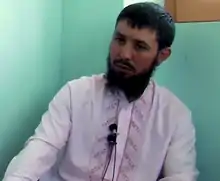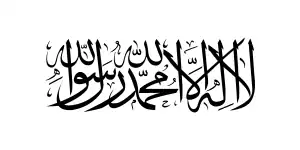Nemat (militant)
Mufti Nemat, also known as Mufti Nematullah Qaweem Persian: نعمت الله قاویم [1][2] or Mullah Nemat Mufti,[3] is an Afghan militant and Salafist cleric who served as a field commander for the Taliban and later the Islamic State's Khorasan Province (ISIL-K) in northern Afghanistan, particularly Jowzjan Province. While waging an insurgency against the Afghan government, he has been accused of committing several war crimes.
Nemat | |
|---|---|
 Mufti Nemat in 2018 | |
| Allegiance |
|
| Years of service |
|
| Rank |
|
| Battles/wars | War in Afghanistan |
| Relations | Mawlavi Habibul Rahman (brother-in-law) |
| Other work | Salafist cleric and religious teacher |
Biography
Early life and service with the Taliban
An ethnic Uzbek,[4] Nemat originally was a religious teacher[5] and mufti[6] in First Vice President Abdul Rashid Dostum's home village in Jowzjan Province.[5] At some point, Nemat became a Salafist[4] and joined the Taliban,[5] forming a small private army to fight for Qush Tepa District. He eventually rose to head of the Taliban military committee for the districts of Darzab and Qush Tepa in Jowzjan,[4] and was considered to be an "important" field commander for the insurgents.[3] It is possible that Nemat took part in "Operation Badr", a major Taliban offensive in northern Afghanistan in 2011.[lower-alpha 1] According to Pajhwok Afghan News, he even served as shadow governor of Jowzjan at some point, and was addressed with the honorific title "Maulvi".[8] Despite this, Nemat was also increasingly criticised by his superiors for various irregularities, including abuse of authority, harassment and torture of locals over taxation, and corruption. While visiting Pakistan in 2013, Nemat was arrested by the Taliban over these issues, and expelled from the rebel movement in 2014.[4][8]
In response, Nemat made a deal with Vice President Dostum[4] in December 2014,[8] and officially surrendered to the Afghan government with 220[6] of his followers in February 2015.[9][10] He and his fighters were promised salaries for six months, and help in finding new civilian jobs.[8] For the next two years, he stayed in Sheberghan, hoping to gain an appointment as commander in the pro-government militias. Nemat also started a Salafi madrasa called E'ya-ye Sunnat ("Rehabilitation of the Sunnah"), and organized classes for male and female students. His Salafist views aroused great opposition from the local religious establishment of Hanafi clerics, resulting in several public debates between Nemat and a number of his opponents. State authorities eventually shut down his madrasa and banned him from teaching in Jowzjan Province in November 2016.[4] Believing that neither Dostum nor the rest of government had upheld their part of the agreement with him,[5] Nemat consequently resumed his insurgency. He joined forces with Qari Hekmat, the leader of the region's branch of ISIL's Khorasan Province.[4][5] Though Nemat later argued that his decision to join ISIL-K stemmed from ideological conviction,[11] an expert of the Afghanistan Analysts Network said that he had probably been more motivated by "power-saving opportunism".[4]
ISIL-K commander
Commanding about 80 fighters, Nemat became the commander for all ISIL-K forces in Darzab's Sar Dara area, and was also appointed by Hekmat as head of ISIL-K's local military court.[9][12] In course of 2017, ISIL-K grew increasingly powerful in northern Afghanistan, and almost completely captured Darzab District from the Taliban and government forces, including Dostum's militias, in April.[9][13] At the time, government officials regarded Nemat as one of the most important Islamic State commanders, stating that "he knows the Darzab District and the area very well; he is a very dangerous guy".[5] Darzab consequently became the group's stronghold, though it repeatedly attempted to expand into other areas.[9][13] Hekmat was killed by a US airstrike in April 2018, and the other northern ISIL-K commanders consequently elected Mawlavi Habibul Rahman,[13][14] Nemat's brother-in-law, as their new leader.[1][13] An expert speculated that Nemat might have played an important role in the succession;[13] in any case, he became ISIL-K's second-in-command for Jowzjan Province after Mawlavi Habibul Rahman's appointment.[6] While serving with ISIL-K, Nemat reportedly committed numerous war crimes.[6]
Surrender
Despite their military successes in 2017, ISIL-K remained threatened by the Taliban in northern Afghanistan, as the latter repeatedly attempted to oust the Islamic State militants from Darzab. A major Taliban offensive in July 2018 eventually overwhelmed ISIL-K's defenses and brought the group's northern branch to the brink of destruction. The Taliban rejected offers for a ceasefire, and demanded that Nemat, alongside Mawlavi Habibul Rahman and Sibghatullah, ISIL-K's local head of finances be handed over to them. At this point, the northern ISIL-K branch split, with a substantial number of fighters defecting to the Taliban, while the three commanders and their loyalists decided to contact the Afghan government and offered their surrender in exchange for protection from the Taliban.[15] Nemat and his fellow fighters, along with their families, consequently fled to government lines in the night, protected by Commandos and the Afghan Air Force.[1][11][16][17]
Following his surrender, the ISIL-K militants were transported to Sheberghan, where they were treated rather well despite the protests of many local civilians and soldiers. Nemat subsequently gave several interviews to the press, declaring that "fake news" were responsible for the Islamic State's bad reputation. He claimed that he and his followers had only launched an insurgency because they were met with hostility by the "whole world", and that he wanted people to accept ISIL's ideology "with their hearts, not by force". Regarding his future, Nemat said that the "Afghan government must save my life and provide me with security" as it promised to do so before the surrender, and that he was not guilty of any crimes.[11] Despite these claims, several women had previously accused him of having abducted and raped them. This was notable, as it was "the first time Afghan women have come forward and accused IS fighters of rape". Rape victims in Afghanistan usually do not speak out due to rape being a taboo topic in the country's society.[6] Other civilians accused ISIL-K of having executed over one hundred civilians, including children, and of practising slavery in Darzab.[11] The government was widely criticised for "its unexplained action of providing asylum and protection to IS-K militants", prompting officials to declare that the Islamic State fighters would be brought to justice.[18]
Notes
- Afghan authorities claimed that "Mawlawi Nematullah", one of "two top Taliban leaders for Jawzjan", fought at the village of al Malik in Qush Tepa from 9 and 11 April 2011. The provincial authorities argued that the man in question was killed in the fighting, but Afghan government claims about Taliban deaths are often unreliable.[7]
References
- Najim Rahim; Rod Nordland (1 August 2018). "Taliban Surge Routs ISIS in Northern Afghanistan". The New York Times. Retrieved 13 August 2018.
- "Darzab District Jawzjan Province". Afghan Bios. 1 August 2018. Retrieved 6 September 2018.
- Jai Kumar (4 April 2018). "IS and its disastrous influence in Afghanistan". The Pioneer. Retrieved 13 August 2018.
- Obaid Ali (18 September 2017). "Non-Pashtun Taleban of the North (4): A case study from Jawzjan". Afghanistan Analysts Network. Retrieved 25 August 2018.
- Jawad Sukhanyar; Rod Nordland (28 June 2017). "ISIS, Aided by Ex-Taliban Groups, Makes Inroads in Northern Afghanistan". The New York Times. Retrieved 13 August 2018.
- Mohammad Habibzada (6 August 2018). "Islamic State Commander Accused of Rape Surrenders". Voice of America. Retrieved 13 August 2018.
- Matt Dupee (17 August 2011). "Operation Badr: tracking the Taliban summer offensive in Jawzjan province". Long War Journal. Retrieved 13 August 2018.
- Tamkin (30 December 2014). "More Jawzjan militants join peace process". Pajhwok Afghan News. Archived from the original on 27 November 2018. Retrieved 27 November 2018.
- Obaid Ali (4 March 2018). "Precarious Consolidation: Qari Hekmat's IS-affiliated 'island' survives another Taleban onslaught". Afghanistan Analysts Network. Retrieved 25 August 2018.
- Sultan Faizy (24 April 2018). "Working With General Abdul Rashid Dostum". The Diplomat. Retrieved 27 November 2018.
- Najim Rahim; Rod Nordland (4 August 2018). "Are ISIS Fighters Prisoners or Honored Guests of the Afghan Government?". The New York Times. Retrieved 13 August 2018.
- "MIxTRAC: Islamic State Targets Foreigners in Tajikistan and Increased Activity in Afghanistan". Mackenzie Institute; Terrorism Research & Analysis Consortium. 7 August 2018. Archived from the original on 6 September 2018. Retrieved 6 September 2018.
- Obaid Ali (15 May 2018). "Still under the IS's Black Flag: Qari Hekmat's ISKP island in Jawzjan after his death by drone". Afghanistan Analysts Network. Retrieved 25 August 2018.
- Bill Roggio (9 April 2018). "US military kills senior Islamic State commander in Afghan north". Long War Journal. Retrieved 13 August 2018.
- Obaid Ali (4 August 2018). "Qari Hekmat's Island Overrun: Taleban defeat 'ISKP' in Jawzjan". Afghanistan Analysts Network. Retrieved 25 August 2018.
- Bill Roggio (1 August 2018). "Taliban says Islamic State has been 'completely defeated' in Jawzjan". Long War Journal. Retrieved 9 August 2018.
- "IS Fighters Surrender to Afghan Forces After Taliban Assault". Voice of America. Associated Press. 1 August 2018. Retrieved 13 August 2018.
- Ayaz Gul (6 August 2018). "Afghan Government Under Fire for Rescuing Islamic State Militants". Voice of America. Retrieved 13 August 2018.
